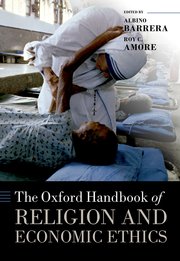Review a book, get a book! Have you read something that has nurtured your faith and scholarship? ESN welcomes reviews of books from various fields of study and various genres. Our article, A Call For Reviews, includes guidelines for submitting reviews. We thank Duane Ebesu for this review that explores how religious values are connected with economic behavior. The Oxford Handbook of Religion and Economic Ethics, edited by Albino Barrera and Roy C. Amore is a learned investigation into the … [Read more...] about Book Review: The Oxford Handbook of Religion and Economic Ethics
ethics
Responding to Overnaming in Academia
Today, Matthew Boedy wraps up his four part series on overnaming. See Post 1 here, Post 2 here, and Post 3 here. For other work by Matthew at the ESN blog, including a series on the academic job search, click here. In this four-part series, I have tried to think about one particular aspect of language: naming. In describing the appearance of our central problem called overnaming, I suggested that when we speak with a moral knowledge we are in fact showing our original sin. But when we speak ethically, we … [Read more...] about Responding to Overnaming in Academia
Daniel: Notes for Bible Study Groups, Part 4
Drawing from her own study of Daniel, the knowledge gained while serving as a teaching assistant for Prof. Iain Provan's Regent College course on Daniel, and the insights gained through talks Carl Ellis gave at an InterVarsity conference, Kathy Cooper has compiled study notes for InterVarsity groups exploring Daniel. These notes are designed to be “plug and play.” While we'll make some further study suggestions for those with extra time, these notes are designed to provide the basis for leading a thoughtful … [Read more...] about Daniel: Notes for Bible Study Groups, Part 4
A Response to Overnaming
In this four-part series, I aim to think about one particular aspect of language: naming. In the introduction, I preliminarily addressed the root of the problem, the Fall. In the second post, I argued the “knowledge of good and evil” we gained at the Fall became the way we separate ourselves from God. We never gained this knowledge as if it was information about good and evil. We instead changed our relationship with naming. Here I want to begin to think through a general response. In the fourth, we will tackle … [Read more...] about A Response to Overnaming
Daniel: Notes for Bible Study Groups, Part 3
Drawing from her own study of Daniel, the knowledge gained while serving as a teaching assistant for Prof. Iain Provan's Regent College course on Daniel, and the insights gained through talks Carl Ellis gave at an InterVarsity conference, Kathy Cooper has compiled study notes for InterVarsity groups exploring Daniel. These notes are designed to be “plug and play.” While we'll make some further study suggestions for those with extra time, these notes are designed to provide the basis for leading a thoughtful … [Read more...] about Daniel: Notes for Bible Study Groups, Part 3




